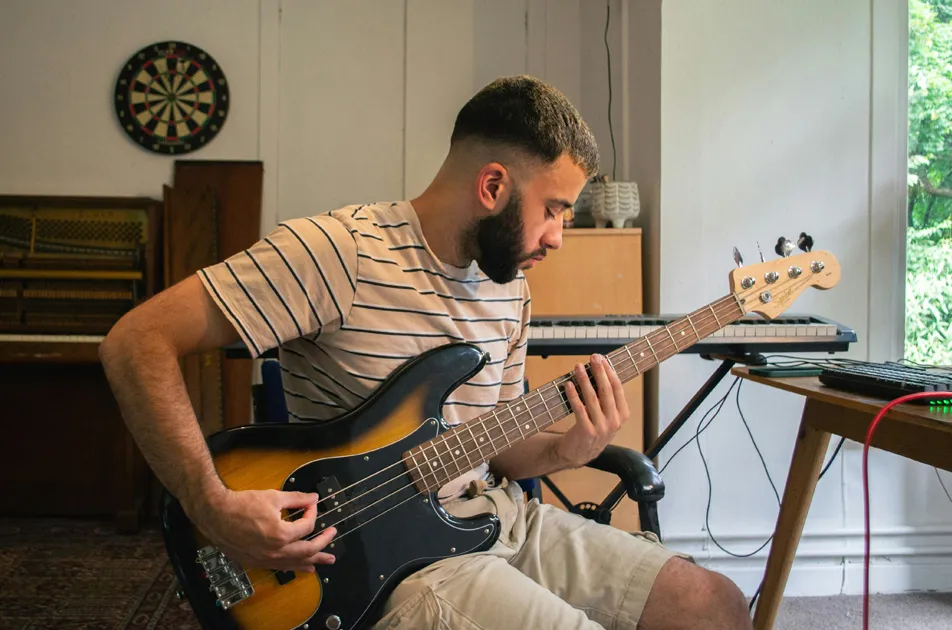With as much as 80% of the typical musicians income coming from performing live, it’s essential to do it right. Learn how to book venues, plan concerts and market live shows with advice drawn from Berklee College of Music’s popular Touring 101 online course.

How to Book Venues, Plan Concerts and Market Live Shows & Tours
by Ale Gil for Berklee Online‘s takenote blog
Live performances are a vital part of an artist’s career, helping musicians expand their fanbase and earn a more reliable income that streaming platforms and merch sales alone often can’t provide. For emerging artists, concert planning can feel overwhelming: Where do you even start? Fortunately, organizing a live show doesn’t have to be intimidating. With the right steps, you can plan successful performances that showcase your music and connect with new fans.
Concert Booking
The best way to decide which venue you would like to perform in is to familiarize yourself with different venues by attending local live events. For every venue you visit, note if it has an adequate infrastructure for the performance you have in mind. Take into consideration stage space and venue capacity by determining if your entire band fits on the stage, as well as the number of people you can reasonably expect to be in attendance. If it’s your first gig, you’ll probably be opening for someone—so try to find a bill where the other bands’ fans are likely to become yours too.
Comparing the venue’s customer demographics with your target audience’s demographics can help you decide if the venue is a good fit for you. Will you be able to expand your fanbase with your performance? To help you determine the best fit, ask yourself the following questions:
- Does the venue have any age restrictions?
- Is this venue close to where my target audience lives?
- Do the live performances in this venue have a similar concept to mine?
- Is the venue suitable for a loud upbeat performance or a quiet acoustic performance?
Hypebot’s Bruce Houghton, who authored and teaches Touring 101 with Berklee Online, explains how to find the right gigs by carefully researching where artists who make music like yours are performing.
When most potential fans walk into a full room, they feel as if they’ve found their community. But when they listen to music in a mostly empty room, they start to question their choice.
Research where similar artists—both musically and in their ability to draw people—play in the area that you want to perform. Next, look at artists who are a bit (but not a lot) more successful than you are.
What other opportunities for gigs might be available to expand your target list? Would this music work at nearby festivals? Getting the right slot to open a show can be a great opportunity. But while they are worth chasing, they can also be very hard to get.
[ALSO: Book More Live Shows with these free Bandsintown Hacks]
Once you have zeroed in on the venues that you would like to perform in, it’s time to start reaching out by sending emails or calling the venue directly. Make sure to introduce yourself as the artist, or as the representative of the artist, and send them an objective, one-paragraph explanation of your/their background, music, and past performances (if applicable!), along with your electronic press kit (EPK) or “one sheet.” These resources will give the venue’s promoters a chance to listen to your music and explore your past performances to decide whether or not they think your show would work for their establishment.
Venues may not respond to emails or calls right away, but the key is to be consistent to show them that you’re highly motivated. If they have not responded within a week, make sure to follow up. However, be mindful of the number of emails you send to avoid appearing too desperate.
In his Touring 101 course, Houghton provides his students with the following guidance about contacting venues:
Find your own pattern of contacting talent buyers, and know that whatever you do, some people will never reply. But keep trying and refining your pitch. You will also learn over time which kind of talent buyer or opportunity is most responsive.
As your list of successes grows, adjust your pitch to include them. It does get easier. As your touring career grows, some buyers will start to contact you.
Make it easy for potential talent buyers to find you. Make sure your contact information is displayed on your website, on your social media, and in every email or other message that you send out.
Additionally, try to make as many connections as possible inside the venues you are visiting. Knowing the personnel who already work there can give you the connections you need to facilitate the booking process. If you get to become friends with a bartender or a sound engineer, they will likely be happy to vouch for you.
Create a Concept
Creating multiple setlists and song arrangements is also important when it comes to planning your show. Having different types of setlists will allow you to adapt your performance to different durations, depending on the venue you are performing in. Having different arrangements, such as upbeat and acoustic versions, will also provide you with more versatility. Acoustic versions might be a better option for coffee shops or fancy restaurants, while you might want to play louder and more upbeat music at a bar.
Concert Budget
Once you have booked a venue and built an entire performance along with your band (if applicable!), consider whether the equipment and other show requirements are within your budget. It is useful to create a list of materials and their respective costs, including costumes, decorations, paid personnel, additional equipment, transportation, and other expenses. Common equipment that the venues provide may include:
- Front of House System (FOH): Speakers, subwoofers, and mixing consoles
- Monitors
- Microphones and mic stands
Most venues provide sound engineers who are responsible for managing the sound system throughout the show.
Similarly, estimate the amount of money you will earn from your performance, from your percentages of ticket sales to merchandise. For pricing, make sure to carefully review your contract with the venue to know how the percentages will be split.
Lastly, it’s important to define the percentages that each person on your team—band members, management, and personnel—will receive from the net income, and define those accordingly in a contract.
Bruce Houghton highlights the importance of the contract between an artist and a venue, as it specifies the income split, which can look different depending on the type of deal being offered. He also stresses that when you are just starting out you might have to be flexible at first.
Early in your career some talent buyers, smaller clubs, and private events may not understand or may even be offended by having to read and sign a complex contract. In these situations, consider writing a confirmation email with the basics—often referred to as a deal memo—and asking them to email a reply acknowledging that they agree.
How much an artist is paid to do a gig is more art than science. Budget, how many tickets they can sell, musical fit, and even how easy the artist is to work with all factor into an offer.
Sometimes the budget or other factors mean that the money offered cannot be negotiated. But while it’s always important to be realistic and reasonable, most deals offered are negotiable in several ways. How, for example, does a different ticket price or 80 percent vs. 70 percent affect the band’s potential to earn more money?
It doesn’t hurt to ask. But never demand, unless you really are prepared to walk away from the gig.
– Bruce Houghton from Touring 101
Concert Logistics
Tech riders are useful tools that can help with the logistics of a show. They are documents that outline the equipment provided by the venue, the equipment that you will need to bring, and the stage setup. This information will help you plan the transportation of said equipment to and from the venue.
Other aspects to take into account include the time for setting up the stage, soundcheck, and packing everything up to leave the venue. Make sure you and your team are well aware of the venue’s policies and timings.
Concert Promotion
The promotion of your show plays a predominant role in its overall success, as it helps attract your target audience to your live event. Make sure you are promoting your show at least two weeks before, so people are aware of the event in time to save the date. Here are some marketing strategies that you can incorporate into the promotion of your show:
- Social Media Posts – Posting creative content is a great way to announce your show to your fans, encouraging their attendance. Consistency can also help attract a broader audience that may also be interested in attending. Most social media platforms allow you to boost your reach with paid ads, using geo-targeting to connect with people in the area where you’re performing and who share similar musical interests.
- Email Lists – Sending emails to a list of local contacts is a great way to reach out to people. Many times, receiving an email directly from the artist makes people feel special, therefore making them more likely to attend the event. If this is your first gig, make sure to START AN EMAIL LIST! It can be as simple as putting a pen and a notebook with a blank page open at your merch table.
- PR Packages – This is a great strategy to use on specific people you really want to have at your show. By sending them a gift, it shows how much it means to you for them to be present. This may inspire them to attend as well as to help you promote the event through their social media accounts.
- Reach Out to Press Outlets – Reach out to local newspapers, radio stations, and other online sources to promote your show. Your appearance in news outlets will increase the chances of more people coming to your show and it will give you more visibility by enabling you to reach a broader audience.
- Print Concert Posters – Hanging posters in the streets or inside places where your target audience hangs out can help spread awareness of your show. Pasting them in doors, on bathroom mirrors, and on elevator walls can be a useful strategy, since these are common places people are used to looking at. If you really want them to look up from their phones, use a striking visual!
[ALSO: How to Promote Live Shows and Tours]
According to Houghton, anyone can become a salesperson if they master the ability to feel and the ability to persevere.
For a salesperson, empathy is the ability to understand the needs of the person or organization they are approaching and working to fill those needs.
In booking, fulfilling a need might mean that the artist can sell enough tickets to justify its asking price or score the opener to the show that was booked that can’t quite sell out the room.
Self-confidence can be channeled when you are booking. Knowing what you are selling, and believing in it, goes a long way towards making that sale. It helps you keep on trying when those first emails and calls are ignored; and it certainly helps one deal with the rejection that inevitably happens, particularly in the early stages. — Bruce Houghton from Touring 101





